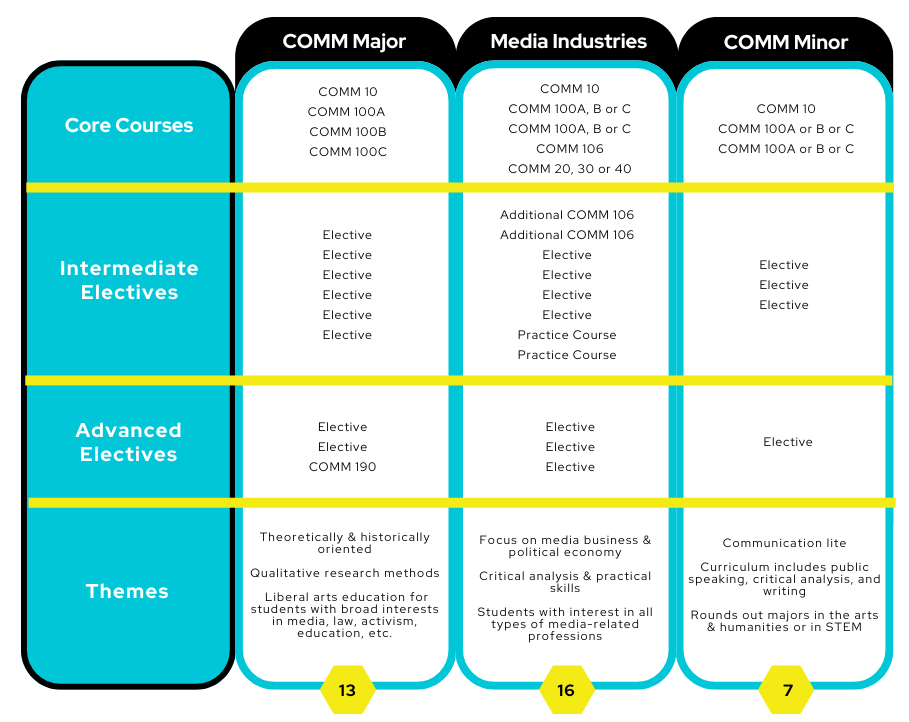Degree Programs
Discover which Communication program is right for you.
The Communication Major
Communication offers a theoretically-oriented investigation of how discourses, communication systems, media institutions, built environments, and human activity together shape economic, political, and cultural life.
The Media Industries & Communication Major
The MIC major provides students with the historical and theoretical background and critical and practical skill sets to analyze an increasingly complex media and communication landscape.
The Communication Minor
Minoring in Communication provides students in a wide variety of disciplines with skills in speaking & presenting, critical writing, analysis, and research.
Program Comparison
Communication Major
- 13 Courses
- Research Course: Junior Seminar
- Themes: Theoretically and historically oriented, qualitative research methods, liberal arts education for students with broad interests in media, law, activism, education, etc
Media Industries & Communication
- 16 Courses
- Practice Courses (skills-centered)
- Themes: Focus on media business and political economy, critical analysis and practical skills, for students with interest in all types of media-related professions
Communication Minor
- 7 Courses
- Curriculum includes public speaking, critical analysis, and writing
- Rounds out majors in the Arts & Humanities or in STEM
Inclusion
Given that cultural and social institutions, flows of power, representation, and critical theory are primary focuses of this program, topics like structural discrimination, equality of access, and identity formation arise in every COMM and MIC course; examinations of race, gender, gender identity, sexuality, class, and disability are fundamental to our teaching. We believe that this course content helps create equitable learning environments both in and out of our classrooms, and allows us to serve a diverse student body and to recognize and address concerns of students from underrepresented groups or from non-traditional educational backgrounds. We honor our students’ lived experiences by embracing them as whole beings, by supporting them in developing their own voices, and by engaging their curiosities about the world while equipping them with the tools to analyze, critique, and engage with it.
Get to Know Us
Faculty of the Communication Department at UCSD have included pioneers of commu nication research, MacArthur, Guggenheim, Mellon and Fullbright Fellows, award-winning filmmakers, and engaged community activists. Today, our faculty come from fields across the Social Sciences and Humanities and bring multiple disciplinary traditions and methodologies to bear in the study of communication as an institutional, technological, cultural, architectural, and cognitive phenomenon, inextricably anchored in and shaped by questions of democracy, diversity, social justice, and social change.
We boast expertise in labor history & organizing, institutional analysis, political economy, ethnography, design, and data science. We are united by a shared investment in affecting positive change within institutions and communities, as well as by our theoretical and methodological perspectives
which prioritize critical analysis, an understanding of social context, recognition of lived experience, and digital culture fluency. Our faculty work to connect academic pursuits with real-world experience, instilling in our students a desire to pursue social justice through critical thinking and writing, public engagement, and community action.
